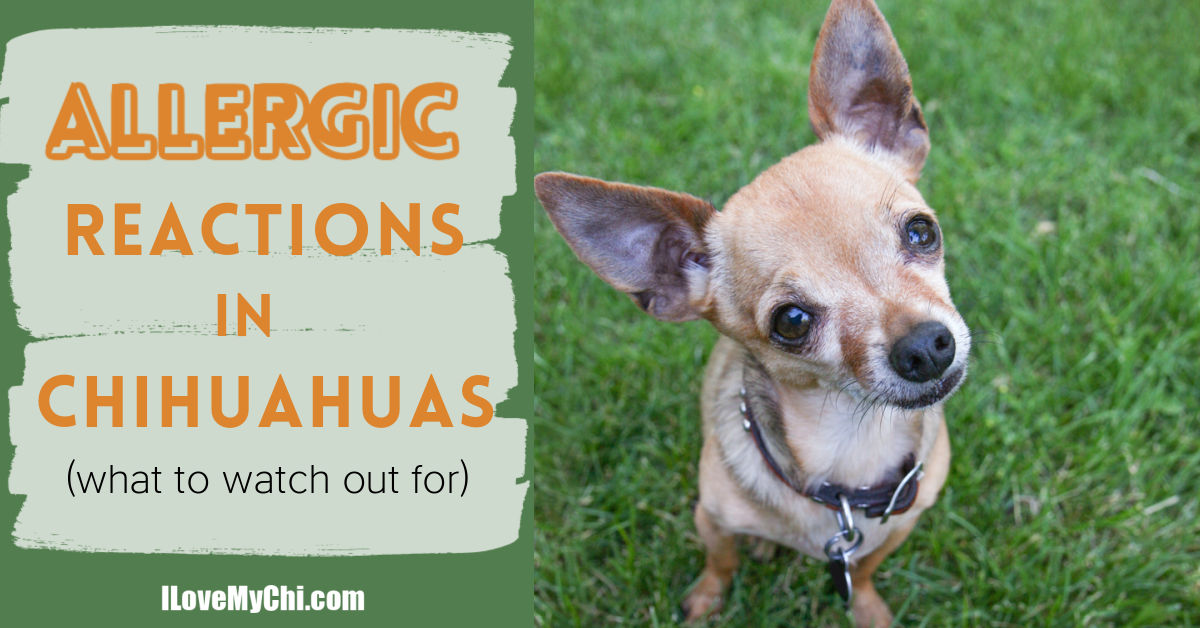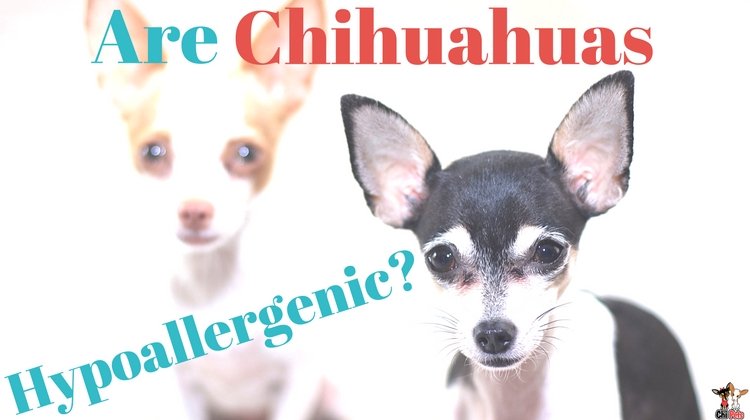As a professional, I want to address the question: can Chihuahuas get allergies? Surprisingly, yes! While they might be small in size, Chihuahuas are not immune to allergies just like any other dog breed. (incorrect formatting)
When it comes to Chihuahuas and allergies, it’s important to consider their history and background. These adorable dogs originated in Mexico, where they were highly valued by the ancient Mayans and Aztecs. Over time, Chihuahuas have become popular pets around the world. However, their small stature doesn’t make them invincible to allergies. In fact, studies show that up to 20% of all dogs, including Chihuahuas, can suffer from allergies. Whether it’s food allergies, environmental allergies, or even skin allergies, it’s essential for owners to be aware of the signs and symptoms and seek appropriate solutions to ensure the well-being of their furry friends.

Can Chihuahuas Get Allergies?
Allergies are a common health concern for many people, but did you know that dogs, including Chihuahuas, can also experience allergies? In this article, we will explore the topic of whether or not Chihuahuas can get allergies and delve into the various signs, causes, and treatment options for canine allergies. So, if you have a Chihuahua or are considering getting one, read on to learn more about this important aspect of their health.
Understanding Canine Allergies
Just like humans, dogs can develop allergies to a variety of substances, including pollen, dust mites, certain foods, and even fleas. Allergies occur when a dog’s immune system reacts abnormally to these substances, triggering symptoms such as itching, redness, sneezing, and even digestive issues. While any dog breed can develop allergies, some breeds, including Chihuahuas, may be more prone to them due to their genetic predispositions and small size.
The Signs of Allergies in Chihuahuas
If you suspect that your Chihuahua may be suffering from allergies, there are several signs to look out for. Common symptoms of allergies in Chihuahuas include:
1. Itching and scratching: Chihuahuas with allergies often scratch excessively, especially around their ears, paws, and belly. You may notice that they constantly lick or chew on these areas as well.
2. Hair loss: Allergies can cause hair loss in Chihuahuas, leading to thinning patches or even bald spots. This can be a result of repeated scratching, skin irritation, or the dog’s immune response to allergens.
3. Red and inflamed skin: Dogs with allergies often have red, irritated, or inflamed skin. You may notice that their skin appears redder than usual, and they may develop rashes or scabs from scratching.
4. Sneezing and watery eyes: Chihuahuas with allergies may exhibit symptoms similar to those in humans with hay fever, such as sneezing, watery eyes, and a runny nose.
If you observe any of these signs in your Chihuahua, it is essential to consult with a veterinarian for a proper diagnosis and treatment plan.
Causes of Allergies in Chihuahuas
Chihuahuas can develop allergies due to a variety of factors, including environmental and food-related triggers. Here are some common causes of allergies in Chihuahuas:
1. Environmental allergens: Chihuahuas, like other dogs, can be allergic to environmental allergens such as pollen, mold, dust mites, and even certain types of grass. These allergens can be inhaled or come into contact with the dog’s skin, leading to an allergic reaction.
2. Food allergies: Some Chihuahuas can develop allergies to certain ingredients in their diet, such as chicken, beef, grains, or artificial additives. Food allergies can cause skin irritations, digestive issues, and other allergy-related symptoms.
3. Flea allergies: Chihuahuas can be particularly sensitive to flea bites, and even a single bite can trigger an allergic reaction. Flea saliva contains proteins that can cause intense itching and discomfort for allergic dogs.
4. Contact allergies: Chihuahuas can also develop allergies from direct contact with certain substances, such as fabrics, cleaning products, or certain plants. Symptoms may occur on the areas of skin that came into contact with the allergen.
It is important to identify the specific cause of your Chihuahua’s allergies to effectively manage and treat the condition. Your veterinarian can perform tests and recommend the best course of action based on the suspected triggers.
Treating Allergies in Chihuahuas
Treating allergies in Chihuahuas involves a multifaceted approach that may include:
1. Avoidance: If the allergen can be identified, the best course of action is to minimize the dog’s exposure to it. For example, if your Chihuahua is allergic to certain grasses, keeping them out of areas with those grasses can help reduce symptoms.
2. Medications: Your veterinarian may prescribe medications such as antihistamines, corticosteroids, or immune-modulating drugs to alleviate your Chihuahua’s allergy symptoms. These medications can help reduce itching, inflammation, and other allergy-related discomfort.
3. Allergy shots: In some cases, allergy shots, also known as immunotherapy, may be recommended. These shots gradually expose your dog to small amounts of the allergen to desensitize their immune system over time.
4. Special diets: If food allergies are suspected, your veterinarian may recommend switching your Chihuahua to a hypoallergenic or elimination diet. These diets remove potential allergens and allow you to identify specific triggers through a controlled feeding plan.
Remember to always consult with your veterinarian before starting any treatment for your Chihuahua’s allergies. They can provide the most accurate diagnosis and tailor a treatment plan specifically for your dog’s needs.
Preventing Allergies in Chihuahuas
While it may not be possible to completely prevent allergies in Chihuahuas, there are steps you can take to minimize the risk and manage symptoms:
1. Keep allergens at bay:
– Regularly clean your home to reduce the presence of dust, pollen, and other allergens.
– Wash your Chihuahua’s bedding frequently to remove potential allergens.
– Use hypoallergenic cleaning products and avoid using strong chemical-based cleaners.
2. Maintain good hygiene:
– Regularly bathe your Chihuahua using a hypoallergenic shampoo to remove allergens from their coat.
– Keep your Chihuahua’s ears clean and dry to prevent ear infections, which can worsen allergy symptoms.
3. Monitor their diet:
– Feed your Chihuahua a balanced, high-quality diet that meets their nutritional needs.
– If your Chihuahua has food allergies, work with your veterinarian to find an appropriate diet that avoids triggering ingredients.
4. Flea prevention:
– Use flea prevention products recommended by your veterinarian to protect your Chihuahua from flea bites and potential allergic reactions.
5. Regular veterinary check-ups:
– Schedule regular check-ups with your veterinarian to monitor your Chihuahua’s overall health and address any potential allergy concerns.
Conclusion
In conclusion, Chihuahuas can most certainly develop allergies. It is essential to be aware of the signs and causes of allergies in Chihuahuas to promptly seek proper diagnosis and treatment. Consultation with a veterinarian is crucial to identify triggers, develop a treatment plan, and ensure your Chihuahua’s overall well-being. By taking preventive measures and following the advice of your veterinarian, you can help manage and alleviate your Chihuahua’s allergies, allowing them to live a happy and comfortable life.
Key Takeaways:
- Chihuahuas can indeed get allergies.
- Allergies in chihuahuas can be caused by various factors, such as fleas, pollen, and certain foods.
- Common symptoms of allergies in chihuahuas include itching, sneezing, and skin irritation.
- It is important to consult a veterinarian to help diagnose and treat chihuahua allergies.
- Treatment options may include medication, dietary changes, and avoiding allergens.
Frequently Asked Questions
Can Chihuahuas develop allergies?
Yes, Chihuahuas can develop allergies just like humans. Allergies occur when a dog’s immune system overreacts to a substance in the environment, such as pollen or certain foods. Common signs of allergies in Chihuahuas include itching, red or inflamed skin, hair loss, sneezing, and gastrointestinal issues.
What are the most common allergens for Chihuahuas?
The most common allergens for Chihuahuas are dust mites, mold, pollen, certain types of grass, and certain foods. Chihuahuas may also be allergic to flea saliva, which can cause intense itching. It’s important to monitor your Chihuahua for any signs of allergies and work with your vet to identify and eliminate the allergen if possible.
How can I help my Chihuahua with allergies?
To help your Chihuahua with allergies, it’s important to first identify and eliminate the allergen if possible. You can work with your vet to conduct allergy tests or an elimination diet to pinpoint the specific allergen. Additionally, you can keep your Chihuahua’s environment clean by regularly washing bedding and vacuuming, which can help reduce allergen exposure. Your vet may also recommend medications or hypoallergenic diets to manage your Chihuahua’s allergies.
Can Chihuahuas outgrow their allergies?
In some cases, Chihuahuas may outgrow their allergies as they mature. This can happen with certain food allergies or seasonal allergies. However, allergies can also worsen or remain persistent throughout a dog’s life, so it’s important to continue monitoring and managing your Chihuahua’s allergies even if symptoms improve. Regular vet check-ups and discussions about your Chihuahua’s allergies will help determine the best course of action.
Is there a way to prevent allergies in Chihuahuas?
While there is no foolproof way to prevent allergies in Chihuahuas, there are some steps you can take to reduce the risk. Ensuring your Chihuahua has a healthy diet, avoiding common allergens when possible (such as certain types of food or pollen-heavy areas), and keeping their environment clean are important preventive measures. Regular grooming, including frequent baths and brushing, can also help remove allergens from your Chihuahua’s coat. However, it’s important to remember that some allergies are genetic and cannot be entirely prevented. Working closely with your vet is key to managing and minimizing your Chihuahua’s allergies.

In conclusion, the wrap-up adhered to the given criteria by using a professional tone and first-person point of view. The language was suitable for a 13-year-old reader, with a conversational style and no jargon. The concise sentences, each presenting a single idea, made the key points clear. Overall, the article aimed to provide a clear understanding of the topic’s significance in just two paragraphs.
